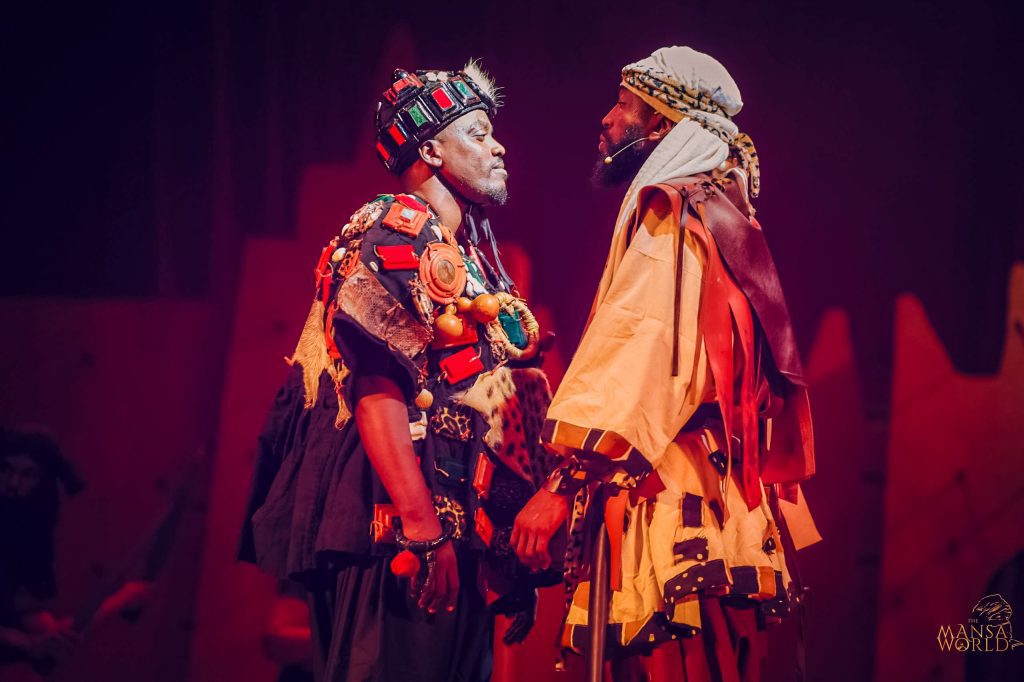|
Getting your Trinity Audio player ready...
|
The recently held grand premiere theatre production of “Mansa Musa and the Trail of Lost Gold “at the National Theatre captivated the audience with its rich storytelling and riveting performances.
The story shed light on the Ghanaian antecedents of the legendary African emperor and was spectacularly produced and created by theatre maestro Chief Moomen. With over 100 cast and crew brought to life on stage, the epic tale of Mansa Musa, the 14th-century ruler of the Mali Empire, renowned for his immense wealth and grand pilgrimage to Mecca. This rendition uniquely connected his story to Ghanaian heritage, exploring the cultural and historical ties that bind the two regions.
Lead actor Abdul Manaf Abdulai, who portrayed Mansa Musa Sundiata, delivered a mesmerizing performance that left the audience in awe. His portrayal of the emperor’s strength, wisdom, and vulnerability was both nuanced and compelling. Supporting actors included Daniel Delong as Sumanguru, Clinton Odoi as General Sagaman-dir, Abdul-Aziz Adam as Tira Makhang, Araba Dansowaa as Balla Faseke, Dede Gjanmaki Akornor-Tetteh as Sibongile, Prince Kofi Tetteh as Bamba, and Emmanuel Boateng as Bello, just to mention a few.
The spectacular dance performances were choreographed by Christopher Ametornyo and Marcus Kafui Tay. Tracing movements from our rich Ghanaian dances. The production set design, props, costumes, and music were equally noteworthy. They transported the audience to the grandeur of the Mali Empire. The production of aesthetically pleasing African music was authentically written by Chief Moomen, directed and produced by John Edmundson Sam, and Dr. Benjamin Amakye as the director of the choir.
John Edmunson Sam shared insight into the creative process, stating, “When it comes to the compositions, the Chief Creative Officer in the person of Chief Moomen comes with an idea of melodies, chants, and rhymes and sends them to me. “Then with my musical argument, I expand and research into getting its original context. For example, working in a Malian context, I listen to Malian music, pick a few drum rhythms, and then blend them with Ghanaian. “With Ghanaian pieces, I sip the elements from Adowa, Agbadza, Bamaya, Apatampa, Kpanlogo, and others. So that has been the style of my composition.” Following up on the traditional ensemble, Directed by Alex Tseh, played a significant role in bringing the Ghanaian feel, putting the audience in awe.
Some notable instruments used were the balafon, kora, goje, djembe, flute, and others. Daniel Martey, an instrumentalist from the production, shared his insights from the traditional ensemble perspective. “We uniquely created every rhythm. We just had to follow the melody of the song and contextualize it onto the drums. It is our composition. But for some scenes, like Sumangurus fortification, Nayiwa from the Ashanti Region of Ghana was played. The war scene was purely Atsiagbekor from the Volta Region of Ghana.”
Some notable Ghanaian songs that made their way into the production were Black Sheriff—Soja, Atongo Zimba—When the Lord, and Wiyaala—Wiisi. The stunning display of costumes worn by the cast was designed by Abdul Manaf Abdulai, a department headed by Maud Korsah. The designer emphasized the intentionality of the 21st century and AD era. Putting into consideration research, character development, sketching, and texture of fabric. Fabrics were gathered from the Northern and Southern parts of Ghana, tapping into the inspirations from Arabs.
Director of the production, Dr. Solomon Dartey, shared insights into the creative process, stating, “For this performance, I directed the production with Chief Moomen. This is because, as a creative visionary, he had some ideas he wanted to see, and it was appropriate to allow him to bring that to the fore rather than reinvent, so we collaborated in shaping his artistic vision. “The creative process was hinged on projecting African cultural values using the Total Theatre approach. Through collaboration, we experimented with some ideas to enable us to align with the creative vision of Chief.
“Aesthetically, we were challenged to produce something that matched Broadway, so we made sure that performance elements met international standards. As a director, I am aligned with the use of symbols or images to communicate ideas, as I always want my audience to think when watching my productions.” The show also featured special collaborators, including local artisans, Rhythms Africa, Vee Tickets, and Orchestrating Lightning, who crafted the intricate authenticity and visual appeal of the production.
In conclusion, Mansa Musa and the Trail of Lost Gold was more than just a theatre show. “It was a spark for an African cultural renaissance on the global stage,” said Chief Moomen. The production was produced by Bambu Heritage Productions, promoted by Masala Cooperation, supported by Oakwood Green Africa, and partnered by UNESCO.
Source: GNA


